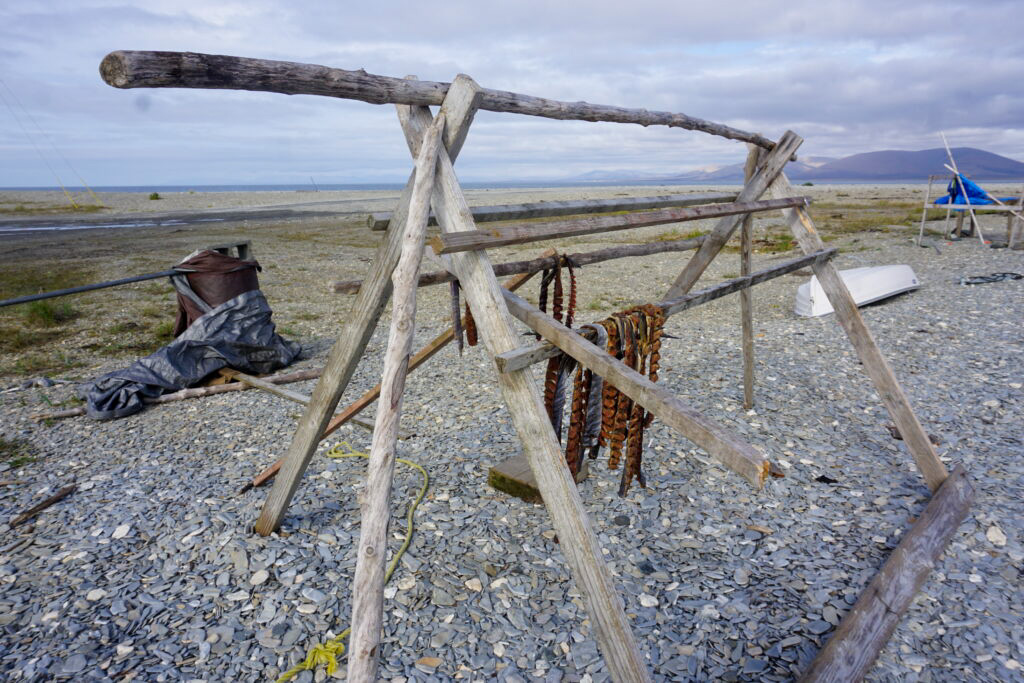The race to represent Alaska’s Bering Strait region in the state Legislature is a rematch of the 2020 House contest. But the issues that drove Tyler Ivanoff to challenge legislative leader Neal Foster two years ago have now shifted.
In 2020, Ivanoff, a teacher in the Inupiat village of Shishmaref, channeled anger over what he considered to be a too-small Permanent Fund dividend to pose a noticeable threat to Foster. Raising only about $1,500 for his campaign, he won 47.5% of the vote in that year’s Democratic primary, allowing Foster a narrow victory then.
This time around, Foster, co-chairman of the powerful House Finance Committee, was one of the key lawmakers pushing for a maximum-sized dividend. He acknowledged that the 2020 election sent him a message about the dividend.
He has always supported what is referred to as the “full PFD,” a dividend paid out under an old and more generous system still in state law, but he also wanted more fiscal reforms, he said by email. “I hoped the legislature would come together on a comprehensive plan, but that has not happened,” he said. “I became tired of the PFD being the only casualty of the deficit. The 2020 election showed that my constituents are also in favor of the full PFD, and so I will continue to fight to represent them and the full PFD come this January.”
In a May 14 floor speech supporting the record $3,284 dividend just paid out last month, Foster said the state could well afford it. “If there’s any year to have a larger PFD, it is this year,” he said in his speech. Thanks to high oil prices, the state was on target to reap $2.4 billion more in revenues than what was expected last fall, he said, “and I think we could share that with folks who are trying to get by.”
Meanwhile, to Ivanoff – running this year as an Alaskan Independence Party candidate and facing off against Foster in the general election — the dividend debate is somewhat played out, even though he is still pushing for the dividend to be enshrined in the state constitution. “People are tired of hearing about the dividend,” he said in a telephone interview. He invoked an adage about a horse, saying that harping on it is “like beating something that’s already dead.”
Now the main issue to him is the collapse of the salmon runs that have plagued western Alaska villages. “We need to figure out why the numbers are so low,” he said. Bycatch by trawlers working in the Bering Sea is one of the factors, he said. His campaign website uses some strong language on the issue: “Getting donated 1 or 2 salmon a year is not acceptable!” it says.
To Foster, the need to ensure rural subsistence users access to salmon has also risen to the top of his priority list, albeit sharing that spot with the defense of the dividend.
And his position on the Permanent Fund remains nuanced.
Aside from their emphasis on Permanent Fund dividend and their shared desire to address the salmon crisis, Foster and Ivanoff have other views in common. Rep. Neal Foster of Nome, the incumbent in House District 38, is a pilot, businessman and triathlete. He is seen here in his plane. (Photo provided by Neal Foster) Both say they would consider revisiting and possibly eliminating oil tax credits, for example.
To Foster, that is a way to protect Permanent Fund dividends. He said he wants the legislature’s fiscal strategy to change from what it was a few years ago, when “there was a lot of emphasis on tackling Alaska’s budget from multiple angles,” including budget cuts, new taxes, smaller dividends – and reductions to oil tax credits.
“I was one of the few who supported this ‘everyone should be a part of the solution’ strategy,” Foster said by email. “But rather than do a little bit of each of those the only thing that occurred was cuts to the PFD,” which hurts lower- and middle-income families the most.
“That is not acceptable, and I will fight to put the PFD first and ask fellow legislators to look at reducing oil tax credits as a first step next session,” he said.
Ivanoff said the state might need to restructure its oil tax system. That includes a new look at the credits being paid to oil companies, he said. “The amount of the deficit is nearly the amount of the credits that are being paid out.”
Both say they plan to work across party lines, but there are differences in how they would do that.
Foster, who has already crossed party lines to endorse Sen. Lisa Murkowski’s reelection bid, is willing to continue being part of a coalition of Democrats, Republicans and independents that has controlled the House. “It’s hard to say where the numbers will fall. But I am open to joining a coalition of moderate legislators who can work together to balance the budget and are sensitive to the needs of rural Alaska,” he said.
Ivanoff portrays himself as something of a free agent, and his caucus plans are not yet clear. He opposes an approach that majority caucuses have traditionally relied on to maintain cohesion: binding members to vote for the caucus’ speaker candidate as well as with the leadership on procedures and the budget.
“I’m really against the binding caucuses,” he said. “It seems like the binding caucus is really making the decisions.”
There are also differences in the candidates’ backgrounds and experience.
Foster is a third-generation Alaska lawmaker. He joined the Legislature in 2010 after he was appointed to succeed his father, Richard, who died in 2009 after representing the district for 21 years. Foster’s grandfather, also named Neal, served in the Legislature during territorial and early statehood years. Tyler Ivanoff, a teacher and basketball coach in Shishmaref, is an Alaska Independence Party candidate challenging Rep. Neal Foster. In 2020, he ran as a Democrat and narrowly lost in the primary. (Photo provided by Tyler Ivanoff) Even before he entered the Legislature, Foster had a high profile in the region. He was the 1990 Nome-Beltz High School valedictorian. He holds a degree from Stanford University, spent a year studying at Oxford University, and has a second degree from the University of Alaska Anchorage. Prior to serving in the Legislature, he was on the Nome City Council. He has a lot of business experience, including executive posts at Sitnasuak Native Corp., the Nome-based village corporation, and the Bering Straits Native Corp., the regional Native corporation.
He is also a pilot, and he has spent much of the past few weeks flying to villages in the region battered by the Typhoon Merbok disaster. And he is a triathlete; he completed this year’s challenging Ironman Alaska event in Juneau.
Foster has maintained a high profile within the Legislature, too, including his position on the Finance Committee. He sponsored, co-sponsored or otherwise took leadership roles in several successful pieces of legislation important to his district and to rural Alaska, including a bill that establishes state recognition of tribes and another bill, signed in May, that increases the rate of state subsidies for rural Alaska household energy use under a program called Power Cost Equalization.
Ivanoff is a former mayor of Elim, the village where he grew up. He is also a former council president of the Native Village of Elim, the tribal government there. He graduated from Mount Edgecumbe High School, the state’s prestigious Native boarding school in Sitka, and is working on a degree in elementary education. He is also a basketball coach.
Foster’s fame is a tough obstacle to overcome, Ivanoff said. That is especially the case for the part of the district south of Norton Sound, encompassing part of the lower Yukon River area, he said. He is reaching out through social media and is hoping to get money to travel through the district. “I’ve also had a difficult time fundraising,” he acknowledged.
The candidates’ financial reports confirm that. As of two months ago, Foster had raised $14,250 for his campaign, while Ivanoff reported only $220, according to Alaska Public Offices Commission reports filed on Aug. 9. The August 16 open-primary results were somewhat similar to the Democratic primary results in 2020, with Foster taking 56% of the fewer than 2,000 total votes cast.
Whoever wins in November might find it difficult to secure a 2023 Permanent Fund dividend approaching the size of this year’s dividend.
In the months since Foster gave his House floor speech supporting a large dividend, oil prices have declined, and expectations of a hefty budget surplus have been tempered. Last month’s update from the state Department of Revenue put oil prices at $91.96 per barrel, about $10 lower than forecast in March, resulting in about $717 million less forecast in state revenue over the fiscal year. If the price for Alaska North Slope crude falls further, averaging $87 a barrel or less over the fiscal year, according to legislative analysis, the state budget will slip back into a deficit.
This article was originally published by Alaska Beacon and written by Yereth Rosen on Oct. 11, 2022.
Alaska Beacon is part of States Newsroom, a network of news bureaus supported by grants and a coalition of donors as a 501c(3) public charity. Alaska Beacon maintains editorial independence. Contact Editor Andrew Kitchenman for questions: info@alaskabeacon.com. Follow Alaska Beacon on Facebook and Twitter.
Image at top: Salmon strips hang to dry on a traditional rack in the Bering Strait village of Teller on Sept. 2, 2021. For Rep. Neal Foster and challenger Tyler Ivanoff, whose previous contest focused on the Alaska Permanent Fund dividend, dealing with western Alaska salmon disasters is now a top priority. Photo by Yereth Rosen, Alaska Beacon.





